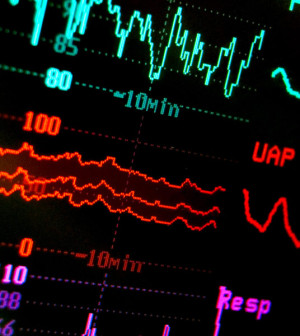- Could Your Grocery Store Meat Be Causing Recurring UTIs?
- Are You Making This Expensive Thermostat Error This Winter?
- Recognizing the Signs of Hypothyroidism
- 10 Strategies to Overcome Insomnia
- Could Artificial Sweeteners Be Aging the Brain Faster?
- Techniques for Soothing Your Nervous System
- Does the Water in Your House Smell Funny? Here’s Why
- Can a Daily Dose of Apple Cider Vinegar Actually Aid Weight Loss?
- 6 Health Beverages That Can Actually Spike Your Blood Sugar
- Treatment Options for Social Anxiety Disorder
Common Abnormal Heart Rhythm Linked to Cancer Risk

Women with a common heart rhythm abnormality may be at an increased risk of developing cancer, particularly of the colon, a new study suggests.
“We found a significant relationship between atrial fibrillation and cancer,” said lead researcher Dr. David Conen, of the University Hospital in Basel, Switzerland.
But the study cannot prove that atrial fibrillation causes cancer, only that an association exists between them, Conen added.
Among nearly 35,000 healthy women followed for about 20 years, those who developed atrial fibrillation had a 60 percent increased risk of cancer diagnosis, the researchers found.
The association may be due to a real connection between atrial fibrillation and cancer, although this seem less likely than that people have shared risk factors for both conditions, including smoking and obesity, he said.
Men probably have the same risk, he said. “There is no reason to believe the risk isn’t the same in men as in women,” Conen explained.
According to Conen, the best way to reduce the risk of atrial fibrillation or cancer is to lose weight, quit smoking and to exercise. “If you reduce risk factors, you are also going to reduce cancer risk,” he said.
For the study, Conen and colleagues followed nearly 35,000 women aged 45 and older who took part in the Women’s Health Study. The participants did not have atrial fibrillation or other heart problems or cancer when the study began. The women were followed between 1993 and 2013 to see if they developed atrial fibrillation or cancer.
During the follow-up period, 4 percent of the women developed atrial fibrillation and about 15 percent were diagnosed with cancer, the investigators found.
Conen’s team said that atrial fibrillation was a significant risk factor for cancer, even after taking other risk factors into account.
The increased risk was higher within three months after developing atrial fibrillation, but the risk persisted over the long term, and an increased risk of dying from cancer was also seen, according to the study.
The researchers looked specifically at lung, breast and colon cancer. The strongest association with atrial fibrillation was seen for colon cancer, Conen said.
Conversely, among women who had cancer, the risk for developing atrial fibrillation was seen only in the three months after diagnosis, he said.
Atrial fibrillation is the most common type of abnormal heartbeat, and is associated with an increased risk of stroke and other heart problems, the study authors noted.
The report was published online May 25 in the journal JAMA Cardiology.
Dr. Emelia Benjamin is a professor of medicine and epidemiology at Boston University School of Medicine and co-author of an accompanying journal editorial. She pointed out that “atrial fibrillation affects about 33 million people worldwide, so it’s a very common condition.”
Benjamin doesn’t believe that atrial fibrillation causes cancer, so she said that people with the condition should not worry about also developing cancer.
“I don’t want people to be concerned that if they have atrial fibrillation they are going to get cancer,” she said. “I don’t want people to worry about that.”
More information
Visit the American Heart Association for more on atrial fibrillation.
Source: HealthDay
Copyright © 2026 HealthDay. All rights reserved.










